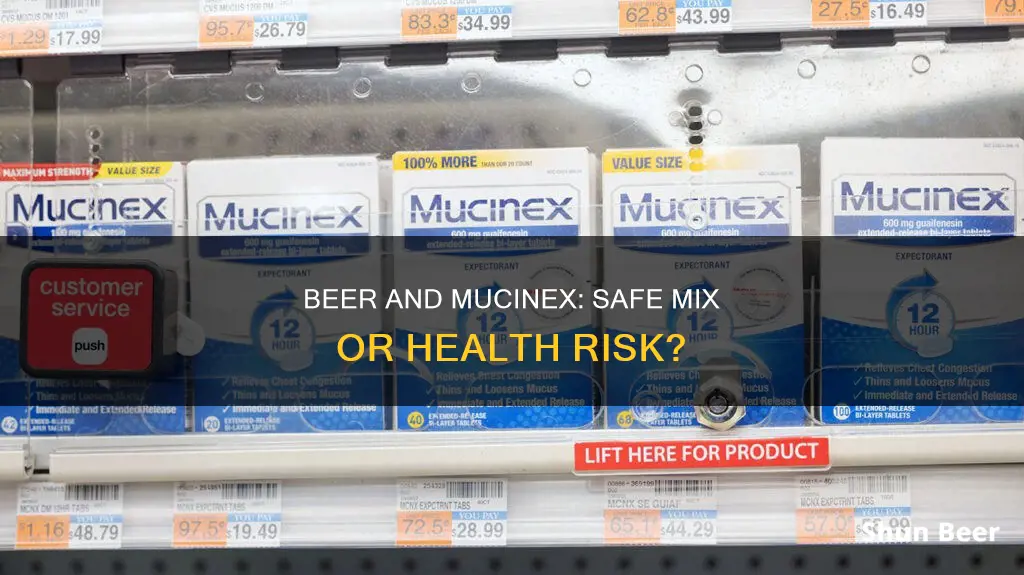
Drinking alcohol while taking medication can be dangerous, and Mucinex is no exception. Mixing alcohol and Mucinex can cause unwanted side effects such as dizziness, drowsiness, nausea, vomiting, rapid heart rate, and liver damage. Mucinex is a medication that contains guaifenesin, which helps to loosen mucus in the lungs, making it easier to cough up. It may also contain other active ingredients such as dextromethorphan, a cough suppressant, and acetaminophen, a pain reliever. While guaifenesin itself does not present a major health risk when mixed with alcohol, the combination of alcohol with dextromethorphan and acetaminophen can have dangerous consequences.
Alcohol is a central nervous system depressant, and so is dextromethorphan. When taken together, they can cause additive central nervous system depression, impairing judgment, thinking, and psychomotor skills. Additionally, alcohol affects the enzymes that process acetaminophen, making the liver more vulnerable to damage. Therefore, it is generally not recommended to mix Mucinex and alcohol.
| Characteristics | Values |
|---|---|
| Is it safe to mix Mucinex and alcohol? | Doctors generally consider it unsafe to mix Mucinex and alcohol. |
| What are the side effects of mixing Mucinex and alcohol? | Increased risk of overdose, rapid heart rate, liver damage, dizziness, drowsiness, nausea, vomiting, hot flashes, hypertension, anxiety, panic attacks, seizures, potential neurological damage, respiratory problems, tolerance or dependence on DXM and alcohol, and more. |
| What are the effects of Mucinex on its own? | The most common side effect of Mucinex is drowsiness. |
| What are the effects of alcohol on its own? | Alcohol is a depressant that can slow a person's breathing, cause dizziness, and affect their balance. |
| What are the risks of mixing Mucinex and alcohol? | Mixing Mucinex and alcohol can cause unwanted side effects and increase the risk of adverse health effects. |
| Are there any Mucinex products that interact dangerously with alcohol? | Mucinex DM, Mucinex Sinus-Max, and Mucinex Fast-Max contain dextromethorphan (DXM) and/or acetaminophen, which can cause dangerous side effects when mixed with alcohol. |
| What are the signs of alcohol misuse? | Isolating from those who don't drink, losing interest in activities, spending a lot of time drinking or recovering from drinking, being unable to stop or decrease alcohol use, experiencing withdrawal symptoms when trying to stop, and continuing to drink despite negative consequences. |
What You'll Learn

Mucinex DM and alcohol
Mucinex DM is a brand of the generic medication guaifenesin, which helps to relieve chest or sinus congestion. It is considered generally safe for most people, but it can interact with other substances, including alcohol.
While Mucinex DM alone does not present a major health risk when mixed with alcohol, the combination may cause unwanted side effects such as dizziness and drowsiness. Both Mucinex DM and alcohol are central nervous system depressants, which decrease the activity of the neurons in the brain and spinal cord. This can cause additive central nervous system depression and/or impairment of judgment, thinking, and psychomotor skills.
Mixing alcohol with Mucinex DM can also increase the risk of overdose. While Mucinex DM does not contain high enough doses of dextromethorphan to cause a deadly overdose, deaths have been reported when alcohol is combined with high doses of dextromethorphan.
In addition, Mucinex DM may also contain acetaminophen, which can cause severe liver damage when mixed with alcohol. Alcohol affects the enzymes that process acetaminophen, making the liver more vulnerable to damage.
Therefore, it is generally recommended to avoid consuming alcohol while taking Mucinex DM.
Drinking Beer at Encinitas Beach: What's Allowed?
You may want to see also

Mixing alcohol with Mucinex side effects
Mixing alcohol with Mucinex is generally considered unsafe and can cause a range of side effects. While Mucinex's main active ingredient, guaifenesin, does not pose a significant health risk when mixed with alcohol, other ingredients in Mucinex products can lead to adverse reactions.
Mucinex is an over-the-counter medication that helps to relieve chest and sinus congestion by loosening mucus in the lungs and respiratory tract. It may also be used to treat other cold and flu symptoms, such as body pain, fever, and sore throat.
The dangers of mixing alcohol with Mucinex primarily arise from the presence of additional active ingredients in certain Mucinex products, such as dextromethorphan (DXM) and acetaminophen.
Dextromethorphan is a cough suppressant found in Mucinex DM, Mucinex Sinus-Max, and Mucinex Fast-Max. Mixing alcohol with dextromethorphan can cause dizziness, drowsiness, nausea, and vomiting. Additionally, both alcohol and dextromethorphan are central nervous system depressants, and their combined effect may lead to severe side effects, including hot flashes, hypertension, anxiety, panic attacks, and potentially fatal seizures.
Acetaminophen, an ingredient in Mucinex Fast-Max and Sinus-Max, is used to reduce fever and relieve pain. When mixed with alcohol, it increases the risk of severe liver damage. Alcohol affects the enzymes that process acetaminophen, making the liver more vulnerable.
Furthermore, alcohol can worsen the side effects of Mucinex, such as increased intoxication, dizziness, drowsiness, and nausea. This is because alcohol can irritate the gastrointestinal tract, heightening the symptoms associated with Mucinex.
In addition, mixing alcohol with Mucinex can lead to an increased risk of overdose. While over-the-counter Mucinex products do not contain high enough doses of dextromethorphan to cause a deadly overdose on their own, combining them with alcohol increases the risk of fatal consequences.
Therefore, it is generally recommended to avoid mixing alcohol with Mucinex to prevent any potential side effects and health risks. Staying sober while taking medication and recovering from illness is always advisable.
Beer and Steroids: A Dangerous Mix?
You may want to see also

Drinking alcohol while sick
Alcohol can also cause dehydration, which can further worsen congestion. Furthermore, alcohol may interact negatively with certain cold medications, such as acetaminophen, chlorpheniramine maleate, pseudoephedrine, and phenylephrine. These interactions can be dangerous and lead to serious health complications.
While some studies suggest that moderate alcohol consumption may reduce the frequency of colds, excessive alcohol consumption is highly damaging to overall health and increases the risk of infection. Therefore, it is generally advisable to avoid drinking alcohol while sick and to opt for alternative treatments or home remedies, such as getting enough rest, drinking plenty of fluids, using saline nasal sprays, or inhaling steam.
It is also important to note that mixing alcohol with certain over-the-counter medications, such as Mucinex, can be dangerous. Mucinex contains guaifenesin, which helps loosen mucus in the lungs, and in some cases, it also contains dextromethorphan (DXM), a cough suppressant. Mixing alcohol with Mucinex can lead to unwanted side effects such as increased intoxication, dizziness, drowsiness, nausea, and liver damage. Therefore, it is generally recommended to avoid mixing alcohol with Mucinex and similar medications.
RV Beer Drinking: What You Need to Know
You may want to see also

Acetaminophen and alcohol
Mucinex is an over-the-counter (OTC) brand that relieves chest congestion and cough. It contains the active drug guaifenesin, which helps loosen mucus from the lungs. While Mucinex does not dangerously interact with alcohol in limited amounts, it is still best to avoid mixing the two to prevent any side effects from worsening.
Now, onto the topic of acetaminophen and alcohol.
Acetaminophen (Tylenol) is a medication that relieves mild-to-moderate pain and fever. It is typically safe to drink a small amount of alcohol while taking this pain reliever. However, mixing acetaminophen and alcohol can irritate the stomach and, in severe cases, cause ulcers, internal bleeding, and
Acetaminophen is metabolized in two ways. Firstly, the body processes around 90% of the drug through a process called glucuronidation, which does not produce any dangerous byproducts. Secondly, the CYP2E1 liver enzyme breaks down around 5-10% of the drug, producing a toxin called NAPQI. In response, the liver produces an antioxidant called glutathione, which the body uses to remove the toxin before it can build up and cause liver damage.
When alcohol is introduced, it increases the activity of CYP2E1, so the body produces more of the NAPQI toxin. Alcohol also decreases glutathione production, meaning NAPQI is more likely to build up in the liver in dangerous concentrations. As a result, the risk of severe side effects may be higher for people with alcohol use disorder (AUD).
To reduce the risk of liver damage from acetaminophen and alcohol, it is recommended to follow these guidelines:
- Take no more than the maximum daily dose of 3,000 mg, or 650-1,000 mg every 4-6 hours for adults.
- Do not take acetaminophen for longer than 10 days in a row for pain or three days in a row for a fever unless recommended by a doctor.
- Drink fewer than three alcoholic drinks per day.
- Check all medications to see if they contain acetaminophen and take only one acetaminophen-containing product at a time.
Symptoms of liver damage include:
- Jaundice (yellowing of the skin or whites of the eyes)
- Pain in the upper right side of the abdomen
- Swelling of the abdomen
- Unusual bruising or bleeding
In summary, while it is generally safe to drink a small amount of alcohol while taking acetaminophen, excessive consumption of either or both can lead to severe and even fatal side effects. Therefore, it is important to follow the recommended guidelines to minimize the risk of liver damage.
Testosterone and Beer: Is It Safe to Drink Alcohol?
You may want to see also

Dextromethorphan and alcohol
Dextromethorphan (DXM) is a common antitussive medication that is a component of many cough and cold medicines. It is a synthetic derivative of morphine that works by inhibiting the release and action of the excitatory neurotransmitter N-methyl-D-aspartate (NMDA), helping to suppress the cough reflex. It is not a controlled substance, but it is listed as a drug of concern by the United States Drug Enforcement Administration (DEA).
When taken as recommended, DXM is safe and has few side effects. However, when DXM is misused, larger doses are taken to achieve a "high" or hallucinogenic effect. Mixing DXM with alcohol is dangerous and can lead to several adverse effects and health problems.
Effects of Mixing Dextromethorphan and Alcohol
- Increased risk of overdose: Both substances are central nervous system depressants, and their combined effects can lead to respiratory depression, slowed breathing, or even stopped breathing.
- Dissociation: Individuals may experience feelings of being out of their body, which can induce panic or anxiety.
- Brain lesions: Prolonged misuse of the combination can lead to memory loss, cognitive impairment, and emotional and behavioural changes.
- Permanent psychosis: The combination of dextromethorphan and alcohol can induce long-lasting psychotic episodes.
- Nausea and vomiting: The mixture can cause severe and prolonged nausea and vomiting, even with low doses of DXM.
- Increased heart rate: Co-use of dextromethorphan and alcohol can lead to a rapid heart rate, which can be dangerous for individuals with cardiovascular issues.
- Liver damage: As both substances are metabolised in the liver, their combined use can increase the risk of liver damage.
- Neurological damage: Chronic abuse of the combination can lead to respiratory suppression and hypoxia, resulting in potential neurological damage.
- Tolerance and dependence: Continued misuse of dextromethorphan and alcohol can lead to the development of tolerance and physical dependence on one or both substances.
- Seizures: In some cases, the combination of dextromethorphan and alcohol may trigger potentially fatal seizures.
It is important to note that the potential interaction between dextromethorphan and alcohol depends on the amount of each substance consumed. Even a small amount of alcohol can have a significant interaction with higher doses of DXM. Therefore, it is strongly advised to refrain from mixing dextromethorphan and alcohol to avoid these adverse effects and potential dangers.
Dry January: Beer or No Beer?
You may want to see also
Frequently asked questions
It is not recommended to drink beer or any other alcoholic beverage while taking Mucinex. Mixing alcohol and Mucinex can cause unwanted side effects such as dizziness, drowsiness, nausea, vomiting, liver damage, and rapid heart rate.
Mucinex is an over-the-counter medication that helps relieve chest and sinus congestion. It contains the active drug guaifenesin, which helps loosen mucus from the lungs, making it easier to cough up.
Alcohol can interfere with the effects of Mucinex and increase the risk of side effects. Additionally, alcohol can weaken the immune system, making it harder for your body to recover from illness.
Mixing Mucinex and alcohol can lead to increased intoxication, as the side effects of Mucinex can amplify the intoxicating effects of alcohol. This includes enhanced drowsiness and dizziness, which can increase the risk of falls and injuries.
Yes, Mucinex DM, Mucinex Sinus-Max, and Mucinex Fast-Max contain dextromethorphan (DXM), which interacts dangerously with alcohol. Mixing high amounts of DXM with alcohol can be life-threatening.







